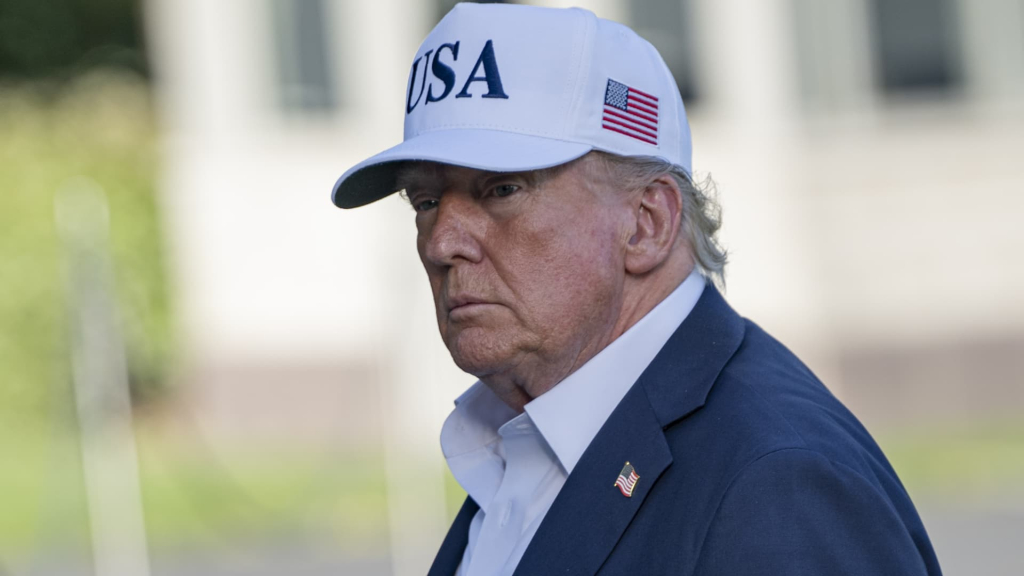Leaders from the European Union are voicing strong reactions to President Donald Trump’s proposed 30% tariffs targeting EU exports, emphasizing the importance of unity, constructive dialogue, and a commitment to reaching a settlement by August 1.
Ursula von der Leyen, president of the European Commission, articulated concerns about the tariffs, stating in a statement that such measures would significantly disrupt crucial transatlantic supply chains, adversely impacting businesses, consumers, and patients on both sides of the Atlantic. She reiterated the EU’s preference for a negotiated resolution, highlighting the bloc’s commitment to maintaining a stable and constructive partnership with the U.S.
Some European leaders expressed sharper critiques of Trump’s announcement. Dutch Prime Minister Dick Schoof described the tariffs as “concerning and not the way forward” in a message on X. Similarly, Spanish Prime Minister Pedro Sánchez labeled the tariffs “unjustified,” while Swedish Prime Minister Ulf Kristersson underscored the EU’s preparedness to implement countermeasures, yet stressed the necessity to avert such escalations.
On Saturday, Trump unveiled the 30% tariff plan through letters to von der Leyen and Mexico’s President Claudia Sheinbaum, shared on his Truth Social platform. He warned that retaliation from either the EU or Mexico would result in an increased tariff rate that could compound the original 30% charge.
Trump also clarified that goods from Europe, as well as companies based within the EU that engage in manufacturing or production in the U.S., would be exempt from these tariffs. In parallel, he dispatched similar communications to 23 other international partners, including Canada, Japan, and Brazil, implementing tariff rates ranging from 20% to 50%.
European leaders have articulated their responses to Trump’s latest trade strategy:
Ursula von der Leyen, president of the European Commission
In her statement, von der Leyen reaffirmed the EU’s dedication to pursuing dialogue and stability:
“We remain ready to continue working towards an agreement by August 1. At the same time, we will take all necessary steps to safeguard EU interests, including the adoption of proportionate countermeasures if required.
Meanwhile, we continue to deepen our global partnerships, firmly anchored in the principles of rules-based international trade.”
Dick Schoof, prime minister of the Netherlands
The Dutch Prime Minister conveyed his thoughts in a post on X:
“The US announcement of 30% tariffs on goods imported from the European Union is concerning and not the way forward. The European Commission can count on our full support. As the EU we must remain united and resolute in pursuing an outcome with the United States that is mutually beneficial.”
Ulf Kristersson, prime minister of Sweden
In a statement made via X, Kristersson indicated that while the EU stands ready to respond with countermeasures, it is crucial to seek alternatives:
“We support the EU Commission’s desire to continue seeking a negotiated solution. The EU is prepared to respond with tough countermeasures if necessary. However, everyone loses in an escalated trade conflict, and it is U.S. consumers who will pay the highest price. Sweden stands up for free trade and international cooperation.”
Emmanuel Macron, president of France
Echoing sentiments of readiness for countermeasures, French President Macron articulated his disapproval of the proposed tariffs in a post on X:
“With the President of the European Commission, France shares a very strong disapproval regarding the announcement of horizontal customs duties of 30% targeting European Union exports to the United States, effective from August 1. In European unity, it is more crucial than ever for the Commission to assert the Union’s determination to resolutely defend European interests. This notably involves accelerating the preparation of credible countermeasures, by mobilizing all available instruments, including the anti-coercion mechanism, if no agreement is reached by August 1.
On this basis, France fully supports the European Commission in its intensifying negotiations to reach a mutually acceptable agreement by August 1, reflecting the respect owed between commercial partners like the European Union and the United States, with shared interests and integrated value chains.
Bernd Lange, Chair of the European Parliament’s committee on International Trade and Standing
Lange remarked that Trump’s letter is “both impertinent and a slap in the face,” as indicated in a post on X. “We’ve been negotiating intensely for more than three weeks – made offers to improve things in mutual interest. Real willingness to negotiate looks different.”
“Period of waiting is over: We’ve postponed the first stage of countermeasures. Firmly convinced they should come into force as planned on Monday, quickly followed by the second list. Activation of rebalancing measures to be discussed.”
The Italian Government Presidency of the Council of Ministers
According to an official statement from the Italian government:
“We trust in the goodwill of all stakeholders to reach a fair agreement that can strengthen the West as a whole, given that—particularly in the current environment—it would make no sense to trigger a trade dispute between the two sides of the Atlantic. It is now essential to remain focused on the negotiations, avoiding polarization that would make reaching an agreement more difficult.”
Pedro Sánchez, prime minister of Spain
Sánchez commented, “Economic openness and trade create prosperity. Unjustified tariffs destroy it,” in a post on X. “That is why we support and will continue to support the Commission in its negotiations to reach an agreement with the US before August 1. United, Europeans form the world’s largest trading bloc. Let us use that strength to achieve a fair agreement.”
Micheál Martin, Taoiseach of Ireland
Martin stated, “The EU and US enjoy the biggest trade and investment relationship in the world. When issues arise between us, they should be resolved by close and respectful dialogue … While it has been clear that all options remain on the table, the EU has also been clear that our preference is for a negotiated solution that avoids escalation. That remains the case.”
This story is developing. Please check back for updates.


























